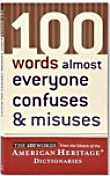

| Book of the Month | ||
 |
100 words almost everyone confuses & misuses |  |
Publisher: Houghton Miffler
Authors: American Heritage Dictionary Editors
$4.95
ISBN 978-0618493333
This little book is one of a series of '100 words'; the others in the series being words that a graduate should know and words that a freshman should know. (A 'freshman' is US English for a first-year student at a college or university.) While the previous two books attempted to expand the vocabulary of American students, this book tries to prevent the misuse of words that users of English think that they already know. For example, as the book points out, the word 'infer' means to understand that something is meant, even though it is not stated directly. However, this word is often misused to mean 'imply' which is to mean something without directly saying it. So a person who asks 'Are you inferring that I speak bad English?' is actually proving that he does indeed speak bad English, because he is misusing the word 'infer'. The book gives one hundred such examples, including 'flaunt' which in phrases such as 'to flaunt the law' has almost the opposite meaning of the correct usage, which is 'to flout the law'. ('Flaunt' means to openly display something, even it it upsets people, 'flout' means to deliberately and insultingly ignore.) Given the number of English words which are misused by students and native speakers, the writers of this book have done well to stop at a hundred, but most of the main victims of careless or ignorant usage are to be found in this collection.
This is a slim book of 120 pages. Apart from a brief introduction explaining the purpose of the book and how each word is treated, the book simply consists of one hundred words, usually one word to a page. Each word is put on a line in thick print, with the phoenetic pronunciation beside it in parentheses. (One page at the start of the book gives the phonetic chart, with a useful guide as to how the symbols are pronounced.) Then we have the definition of the word, its grammar type (noun, adjective, verb etc) and a brief etymology giving the history of the word if this is known and relevant. For example people often assume that because words like 'inaccessible' or 'indecent' are the opposite of 'accessible' and 'decent', then 'inflammable' is the opposite of 'flammable'. However, the 'in' of 'inflammable' is like the 'in' of 'infer' and means 'taking in'. So something inflammable carries in flame, and can also be called 'flammable'.
There are no pictures in the book, and because the words are arranged alphabetically from 'adverse' to 'zoology' there is no need for an index either. Some words often misused by the media are missing - such as 'careen' for 'career' (the latter word meaning to run out of control). Also missing from the book are words which have different meanings in American English and British English, despite the fact that these are definitely confusing. A Briton who decides that he will drive 'momentarily on the pavement' will drive for a short time on the side of the road reserved for pedestrians. An American using the same words will very soon drive on a hard road surface. Also some of the words in the book are not misused but mispronounced - by Americans. The rest of the world has no problem with 'nuclear', but in the USA the word has two very different pronunciations. What the book does not do is give examples of misuse, perhaps to prevent people from getting confused when they try to remember which is the correct use and which is the misuse. For the same reason many English language textbooks do not give examples of wrong usages. Instead we get examples of correct usages, usually from American literary classics. Sometimes these quotes take up a whole page, and occupy space that could instead be usefully employed to make this a book of 115 words almost everyone misuses and confuses.
Who is this book for? If you have ever written a piece of particularly fine prose in an essay or formal letter, you will know that one misuse of a word can ruin the entire effect you are trying to create. This book is a handy check for some of the most common mistakes. The disadvantage is that with so many online reference dictionaries which can be easily accessed by anyone with a smartphone or an internet connection, this book has been made obsolete by technology. Still, it is interesting to read short sections when one has a few spare moments, and can help a language student to build vocabulary.
Verdict: Outdated by the internet
Assessment 3/10